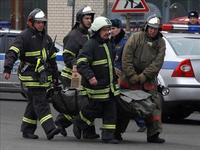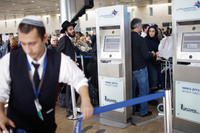-
Technology for monitoring wine quality to improve airport security
A university of California Davis professor a magnetic resonance scanner — similar to machines used in medical scanning — to check the quality of wine; he then realized that the method could be used at airports to check bottles and cans for explosives without opening them; “I’m a tinkerer, I like to build stuff,” said Matthew Augustine, a chemistry professor at the school
-
-
TSA blog does little to allay fears of Domodedovo-like incident
At Moscow’s Domodedovo Airport a few weeks ago, a suicide bomber walked into the arrivals hall and killed 35 people and injured 168; on its blog, TSA says that one of the measures the agency has instituted — installing behavior detection officers (BDO) at U.S. airports to spot suspicious behavior — would go a long way toward preventing a Domodedovo-like incident in the United States; skeptics beg to differ
-
-
Pistole takes aim at Mica
The decision by the TSA to deny an application by Springfield-Branson Airport in Missouri to privatize its checkpoint workforce signals a turnaround in TSA policy; until recently TSA said it neither endorsed nor opposed private screening; TSA would keep contractors at sixteen out of roughly 460 U.S. airports, but would refuse to employ others elsewhere unless clear advantages were made known
-
-
TSA halts private security screener program
In an about face, the TSA has halted its private screening program at airports; last December the TSA declared that it was neutral on the program, however last Friday the TSA denied an airport in Missouri its request for private screeners and declared that it would reject all incoming proposals; Representative John Mica, a vocal advocate for the program, was shocked to hear of TSA’s new plan and promised to launch an investigation into the matter; currently less than twenty airports use private security screeners
-
-
Syracuse mayor determined to use private contractors at airport
With more than 100 police officers working overtime at the Syracuse airport, the average cost to the city, after salary, pension costs, and Social Security taxes amounts to $63 an hour per officer; the city mayor says that high air fares from the major air carriers affiliated with Syracuse’s Hancock International Airport are mostly due to security costs — and one way to reduce these costs is to replace the officers with a private sector contractor
-
-
TSA will not expand private screening at airports
The Transportation Security Administration (TSA) has decided not to expand a program that would allow airports to replace government security screeners with private screeners; the news comes a month after the agency said it was “neutral” on the program; the private screening program became popular following the uproar over enhanced security pat-downs, which some travelers found intrusive — even though private screeners must follow the very same procedures government screeners do
-
-
Wheel-well passengers typically die
The FAA has counted eighty-six cases of wheel-well stowaways in the United States since 1947, with the majority of them having occurred since the late 1990s; out of the cases reported by the FAA, eighteen people have survived; the TSA is mentioned to have been working collaboratively with the DHS Science and Technology Directorate to develop stowaway detection technologies
-
-
Moscow airport blast to force security rethinking

Experts say it is significant that those who masterminded the Moscow attack chose to bomb the arrivals hall of the airport — Moscow’s busiest — because it was an easier target than the heavily-policed departures area; one expert says: “Arrivals has always been thought of as the ‘soft’ area of an airport —- Nobody is flying anywhere, the baggage has all been screened, because it has been on planes already, and crucially, people are leaving the airport. It’s very rare that you ever saw somebody carrying a bag in to arrivals”; airports may begin screening people who come to meet friends and family at arrivals; “What will happen is that the barrier will get further and further back, so no longer is it just at departures, but at the airport door, or in some cases on the road as you drive up to the terminal,” says the expert
-
-
Pointing lasers at aircraft a growing problem
According to the FBI, in 2008 there were approximately 1,000 instances of people aiming laser pointers at the pilots of aircraft; in the eight month period from January to August of 2010, there were 1,700 reported incidents, demonstrating an increasing trend in the cases; the light emitted by a laser pointer can then be directed toward and seen by a pilot, causing visual impairment such as glare on the windshield of the aircraft as well as flash blindness and after-images like the kind that can be experienced after a flash picture is taken; even if the beam does not hit the pilot directly causing temporary blindness, the beam can be distracting at times when distractions can be deadly
-
-
Israel slow on aviation reform
The vaunted Israeli airport security has come under criticism lately; the U.S. government has ranked Israel’s air safety among the world’s worst, lumping it with countries like Bangladesh, the Democratic Republic of Congo, Haiti, and Zimbabwe; the reason: although Israel has never experienced an airport crash, experts say civil aviation in the country was neglected for decades, with authorities slow to renovate runways and introduce state-of-the-art instrument landing and radar technology; crowded airspace shared by civil and military flights further complicates matters
-
-
Private security screeners an alternative to TSA at airports?
Representative John Mica (R-Florida) believes that using private security screeners at airport checkpoints is more efficient and cheaper; last November Mica sent letters to roughly 200 airports urging them to switch from the TSA to private screeners; seventeen airports in the United States currently use private screeners, including San Francisco International, Kansas City International, and Jackson Hole; advocates believe that private security firms offer better customer service and perform better because they are more easily held accountable; others are more skeptical, citing the fact that private screeners must follow the same procedures as TSA screeners and that it is uncertain whether using them actually saves money
-
-
Woman wins payout after screener exposed her breasts
U.S. woman was awarded a nominal sum from the government after a TSA pat down exposed her breasts; in May 2008, Lynsie Murley was singled out for an extended search during which agents pulled down her shirt and exposed her breasts; the agents then laughed and joked about the incident
-
-
TSA brings 100% cargo screening forward to 2011
The Transportation Security Administration (TSA) has brought forward its 100 per cent cargo screening target to 31 December 2011; the earliest possible implementation date for 100 per cent screening was initially thought to be 2013, given the complex challenges associated with screening international inbound cargo carried on passenger aircraft; now 100 per cent of the cargo that is uplifted on passenger aircraft bound for the United States must be screened by the end of this year
-
-
Napolitano says Israeli-style security is not suitable for U.S.

DHS secretary Janet Napolitano is in Israel on a visit; during her private briefing with Israeli officials at Ben-Gurion Airport, they discussed cargo screening and how to stop non-metallic explosives, such as those used in the recent plots, from getting onto a plane; Napolitano was also briefed on other airport security measures used in Israel; Napolitano said, however, that what is effective in Israel, a nation of 7.3 million, would not necessarily work for 310 million Americans; Ben-Gurion is Israel’s only major international airport; the United States has 450 such facilities; about eleven million people pass through Israeli airports each year, while seventy times that many passengers go through American airports each year
-
-
More airports consider replacing TSA with private contractors
Airports around the United States — including airports in Los Angeles, the Washington, D.C. metro area, Charlotte, North Carolina, and Orlando, Florida — are considering replacing the TSA with private security contractors; privatizing security will not affect cost or protocol, but could bolster efficiency and customer relations
-
- All
- Regional
- Water
- Biometrics
- Borders/Immig
- Business
- Cybersecurity
- Detection
- Disasters
- Government
- Infrastructure
- International
- Public health
- Public Safety
- Communication interoperabillity
- Emergency services
- Emergency medical services
- Fire
- First response
- IEDs
- Law Enforcement
- Law Enforcement Technology
- Military technology
- Nonlethal weapons
- Nuclear weapons
- Personal protection equipment
- Police
- Notification /alert systems
- Situational awareness
- Weapons systems
- Sci-Tech
- Sector Reports
- Surveillance
- Transportation
Advertising & Marketing: advertise@newswirepubs.com
Editorial: editor@newswirepubs.com
General: info@newswirepubs.com
2010-2011 © News Wire Publications, LLC News Wire Publications, LLC
220 Old Country Road | Suite 200 | Mineola | New York | 11501
Permissions and Policies
Editorial: editor@newswirepubs.com
General: info@newswirepubs.com
2010-2011 © News Wire Publications, LLC News Wire Publications, LLC
220 Old Country Road | Suite 200 | Mineola | New York | 11501
Permissions and Policies
